constituent assembly of india debates (proceedings)- volume vii
constituent assembly of india debates (proceedings)- volume vii
constituent assembly of india debates (proceedings)- volume vii
You also want an ePaper? Increase the reach of your titles
YUMPU automatically turns print PDFs into web optimized ePapers that Google loves.
States.<br />
We are aware that many problems will arise in the course <strong>of</strong> allocating these proceeds between the<br />
different States, but they are not insoluble, and can be solved on lines similar to those followed in<br />
allocating similar revenues between the Provinces.<br />
92. The need for a uniform system <strong>of</strong> income-tax both in the Provinces and in the States has become<br />
urgent not only because <strong>of</strong> the facilities afforded for evasion and avoidance <strong>of</strong> the Central Income-tax by<br />
the existence <strong>of</strong> States with lower rates <strong>of</strong> taxation or no tax at all, but also because it is alleged that<br />
industries are being diverted artificially by the incentive <strong>of</strong> lower taxation to areas not inherently suited<br />
for the industries.<br />
93. Though we do not favour any abrupt change in the status quo, we do not attach much weight to<br />
the argument that the States are, as a whole, industrially backward and that they cannot, therefore,<br />
stand the same high rates <strong>of</strong> taxation, particularly income-tax, as the Provinces can. If the productive<br />
capacity <strong>of</strong> a State, and consequently its level <strong>of</strong> income, is low, it follows that the State will not have to<br />
contribute much by way <strong>of</strong> tax if it falls in line with the Provinces. If, on the other hand, the point is that<br />
industries should be artificially stimulated in the States somehow by the incentive <strong>of</strong> lower taxes, it is<br />
obvious that if the State is not suited for industrial development, the cost <strong>of</strong> bolstering up its industries<br />
must ultimately fall upon the Provinces and other States.<br />
94. As already stated, we are not in a position to make detailed recommendations regarding the<br />
States. We recommend for this purpose the establishment <strong>of</strong> a States Commission with five members<br />
who should possess wide knowledge <strong>of</strong> the financial administration <strong>of</strong> Provincial, Federal or State<br />
Governments. Preferably, one <strong>of</strong> these members might be a member <strong>of</strong> the Finance Commission (for<br />
Provinces) referred to earlier in this report. The Commission should advise the President, as also the<br />
States, about their financial systems and suggest methods by means <strong>of</strong> which the States could develop<br />
their resources and fall into line with the Provinces as quickly as possible. One <strong>of</strong> the first tasks <strong>of</strong> the<br />
Commission will be to examine in detail the privileges and immunities enjoyed by each State, and also<br />
the connected liabilities, if any, and recommended a suitable basis <strong>of</strong> compensation for the extinction <strong>of</strong><br />
such rights and liabilities. We consider in particular that the States Commission should deal with the<br />
problems before it with understanding and sympathy and suggest solutions which would not only be fair<br />
both to the States and to the Provinces, but enable the States to come up to the Provincial standards in<br />
as short a time as possible.<br />
95. The States which come into the above arrangements would pay their contribution for Defence and<br />
other Central services through the share <strong>of</strong> the net proceeds <strong>of</strong> Central taxes retained by the Centre, and<br />
nothing more should be expected from those States. On the other hand, the States which accede but do<br />
not come into the above arrangements, should pay a contribution to the Centre, the amount <strong>of</strong> which<br />
should be determined by the States Commission having regard to all the relevant factors.<br />
96. The constitutional arrangements in this respect, particularly during the interregnum <strong>of</strong> 15 years,<br />
should, in our opinion, be kept very flexible. The President should be enabled by order to adopt any<br />
financial arrangement he may find expedient with each State until such arrangement is altered by an Act<br />
<strong>of</strong> the Federal Legislature after necessary consultation with the States.<br />
97. While the outlines which we have indicated above are capable <strong>of</strong> being applied to most <strong>of</strong> the<br />
major or even middle-sided States, it is, in our opinion, necessary to group together a number <strong>of</strong> smaller<br />
States in sizable administrative units before they can be brought into any reasonable financial pattern.<br />
98. We are sorry that we have not been able to contribute anything more precise then we have done<br />
to this part <strong>of</strong> the terms <strong>of</strong> reference to us.


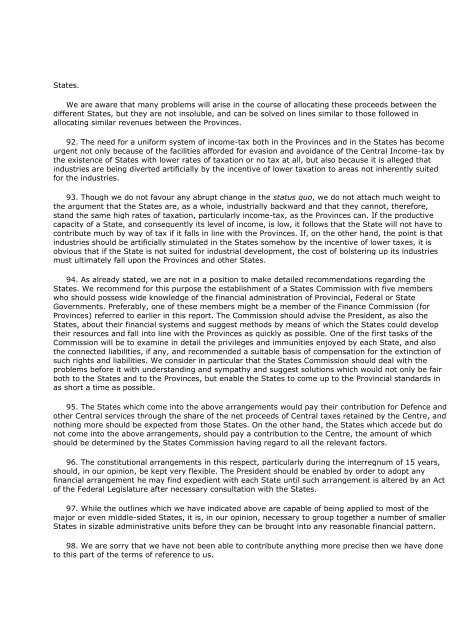
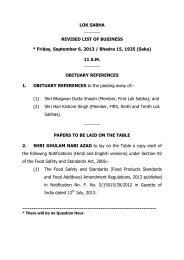
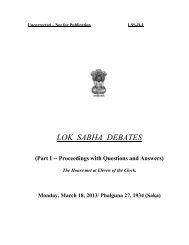
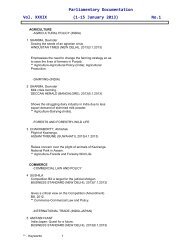
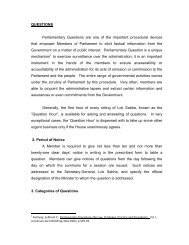
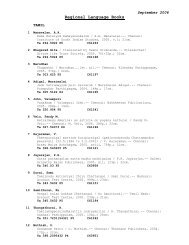
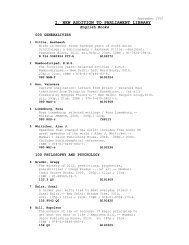
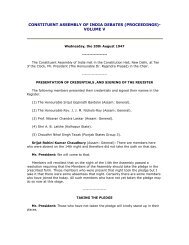
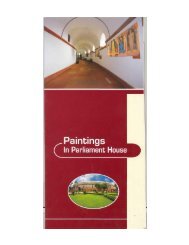
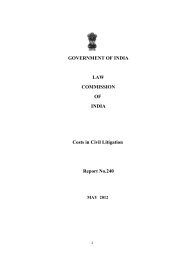
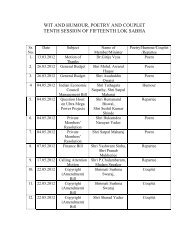
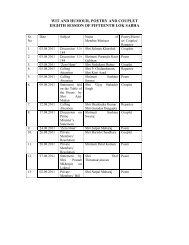

![gÉÉŌ A.]ÉŌ. xÉÉxÉÉ](https://img.yumpu.com/8015720/1/190x245/geeo-aeo-xeexee.jpg?quality=85)
